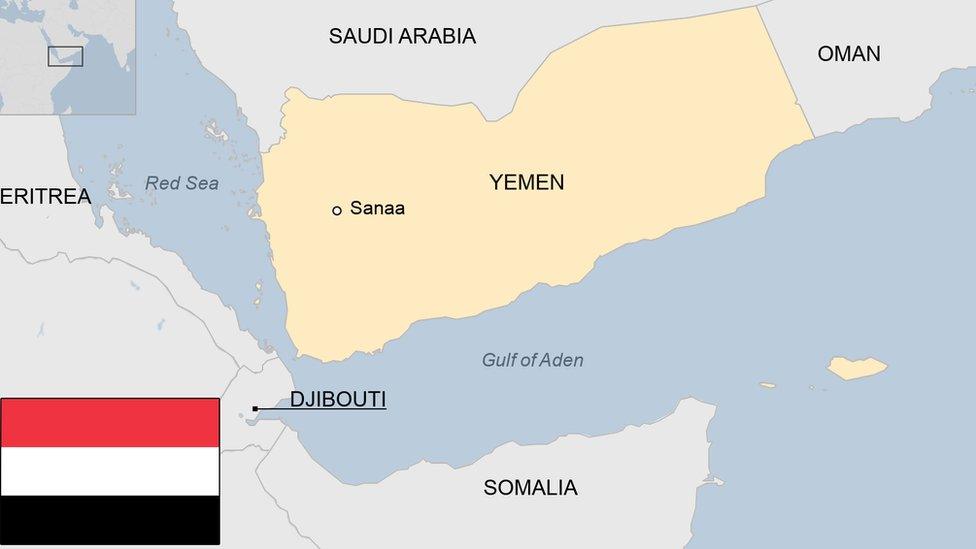Four Irish Guards killed in hand to hand fighting
- Published
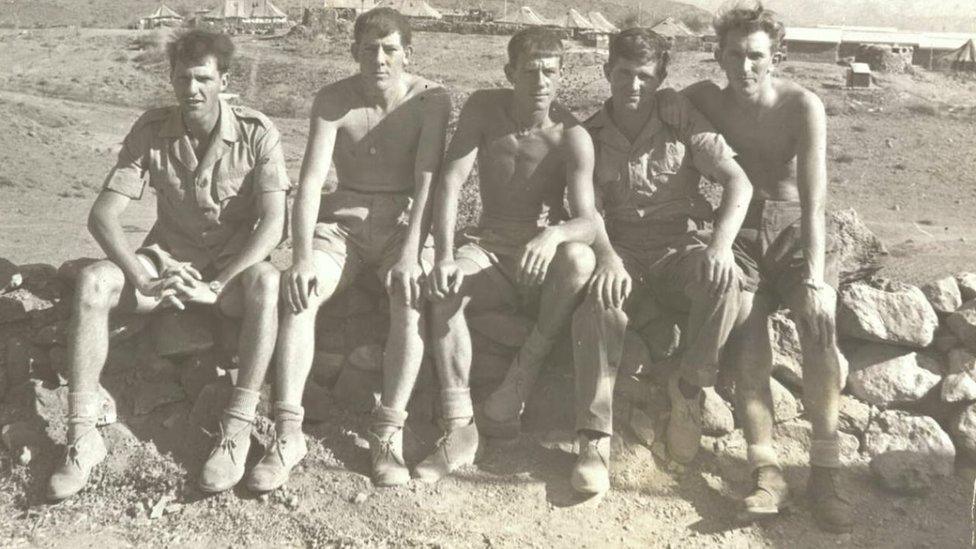
Dennis Cargin (third from left) and his colleagues in Aden in Christmas 1966
As darkness settled on the hot dusty desert, Guardsman Dennis Cargin and his colleagues watched and waited in eerie silence.
The mountain track that was the focus of their attention was, quite literally, the furthest-flung outpost of the British Empire as it was then constituted - Aden.
The soldiers, from 2 Company of the 1st Battalion Irish Guards, were one prong in a three-pointed ambush plan.

What was the Aden conflict?
British rule began in this part of South Arabia in 1839.
Aden was strategically important for protecting ships sailing to and from India.
In 1963, an armed insurgency began against the British Crown Forces.
It was inspired by a wave of Arab nationalism following the Suez crisis.
The British left Aden in 1967. It is now part of Yemen.

Intelligence suggested heavily-armed dissident tribesmen would be making their way along this track, intent on attacking the British base at Dahla, about a mile away.
If all this seemed strangely alien to the young Guardsman Cargin, having not long left his native Banbridge, he would have little time to dwell on it. Within minutes, he was to be in a close-quarters battle for his very life.
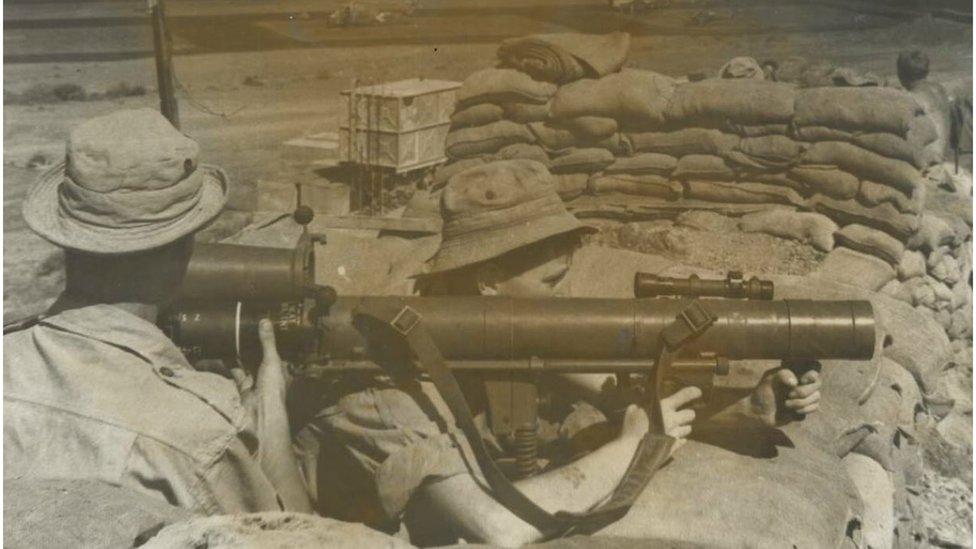
Guardsman Trevor Bell firing a Carl Gustaf in Aden. He was killed some time later.
Guardsmen Cargin explained: "We saw the tribesmen on the path as expected, but when they came level with us, instead of keeping on the track, they turned left and that meant they were coming straight through our position, so it was very close quarters, hand-to-hand fighting. The result was four of our boys dead and we had to send for reinforcements. The tribesmen were all battle-hardened - we weren't. For most of us, this was our first experience of battle."
The four who died were Sergeant Patrick Thunder, Lance Sergeant Patrick O'Reilly, Lance Corporal Michael Frear and Guardsman Trevor Bell.
A week after the incident, in April 1967, the Irish Guards' newspaper, the Harp, carried a dramatic account.
It reported: "Caught very close to the patrol, the dissidents, realising the futility of withdrawal, advanced with characteristic bravery, firing their rifles and machine guns, throwing grenades and using with terrifying effect their blindicides (rocket launchers). With equal determination, the patrol repulsed the rebels."
As dawn broke, a follow-patrol of Irish Guards discovered that the dissidents too had suffered heavy losses.
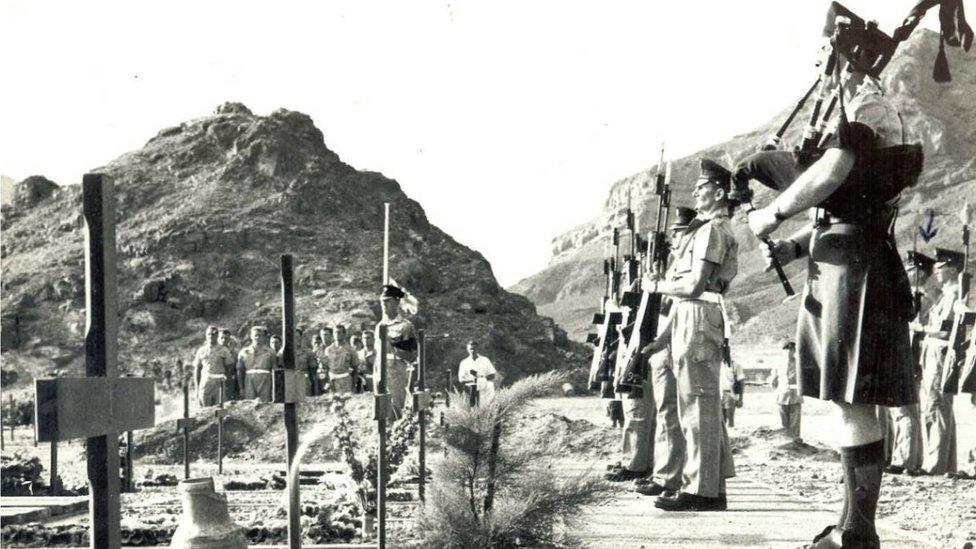
The joint funeral service for three of the four Irish Guards killed in close quarters fighting in Aden
The 'Harp' reported: "Our dead were proudly but sadly borne from the medical centre to be flown to Aden. The route was lined by Guardsmen and the procession was led by the pipe major.
"Guardsman Cargin, who was wounded in the ambush, was casevaced (emergency evacuation) to Aden during the night. He is now out of hospital and is making a good recovery.
"Tragic as the loss of four members of the battalion is, and nothing is compensation for it, let it be known that this was one of the most successful engagements since the Radfan campaign. The enemy's casualties are confirmed as four dead, including Al Hukabi, a notorious dissident leader, and some seven wounded. We must be proud that No. 5 platoon fought so gallantly and were prepared to fall at their posts in a desperate action in which they gave no quarter."
Three of the dead soldiers were buried in Aden, while Guardsman Trevor Bell was laid to rest at Trummery in his native County Down.
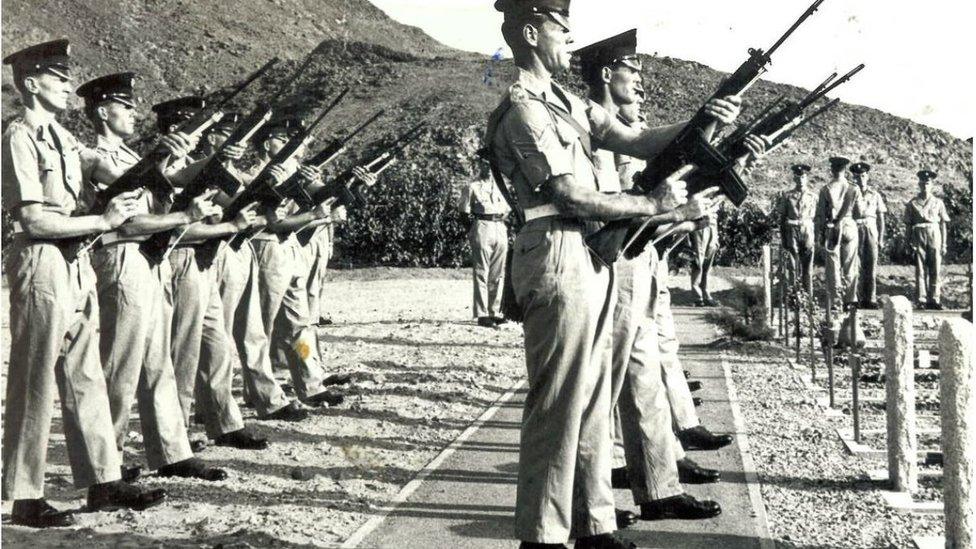
Irish Guards fire a salute over the graves of their fallen comrades in Aden in April 1967
Guardsmen Cargin says Aden is a forgotten conflict. "The only people who remember Aden are the people who were there; the people who served there; and the wives and families who lost husbands and brothers and sons."
He says most of the young soldiers knew little of the complex politics which were at play in the Middle East at that time.
"No, we were just following orders; we hadn't a clue. It was a posting, it was an overseas posting: 'get on with it' and that's it. All we wanted to do was get our 10 months done and get home safe.
"The British government, whenever we left, they sat down with the strongest of the terrorist organisations and handed the country over to them. They knew before we even went there that they were handing the country over. And our boys? Well, you could have said that really and truly they died for nothing. They shouldn't have died at all."
All British soldiers withdrew from Aden on November 30, 1967, and the Independent People's Republic of Yemen was proclaimed.
- Published13 February 2024
